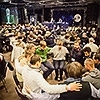Audio Version Of The Blog – 8/1/23
Listen to an Audio Version of the Blog
Download:MP3 Audio

Listen to an Audio Version of the Blog
Download:MP3 Audio

Michael Laitman, On The Times of Israel: “Dale Carnegie’s Quest for Happiness”
Dale Carnegie was an American psychologist, speaker, and author. He made a significant impact on countless lives through his inspirational teachings and best-selling books. A staple in the realm of self-help literature, Carnegie’s most well-known book, How to Win Friends and Influence People, has sold millions of copies worldwide and continues to be a go-to resource for improving interpersonal communication skills. Carnegie’s lectures and seminars drew large crowds eager to gain insights into personal growth and better communication skills.
Significantly, it turned out that America’s foremost promoter of unwavering optimism and enthusiasm experienced a period of depression and loneliness toward the end of his life. After he was diagnosed with lymphatic cancer, Dale Carnegie was overwhelmed by feelings of sadness and isolation. These feelings were compounded by the absence of close friendships during this challenging period. Despite his teachings emphasizing the importance of social connections and the value of maintaining strong relationships, he found himself lacking the support system he had advocated for throughout his career.
The irony of his situation is hard to ignore. While Carnegie offered guidance and inspiration to millions, his books and lectures did not grant him immunity from the struggles of loneliness and unhappiness. It goes to show the limits that such teachings, which are based on psychology, can reach. While Carnegie was correct in highlighting the importance of meaningful relationships and strong social networks, we need more than psychology to achieve true connection and happiness.
After all, we are born egoists, desiring to enjoy for self-benefit alone, and psychology measures everything solely within the framework of our egoistic nature. That is why despite employing the best psychological tricks, we can be left alone and lonely when we need others the most. Likewise, we can easily turn away from others when we no longer benefit from them.
As we age, our egoistic powers gradually weaken and dissolve. When we lose all desires, the body dies. The exact circumstances of Dale Carnegie’s death remain uncertain. An official statement from Dale Carnegie & Associates stated that he died of Hodgkin’s lymphoma, but it is widely rumored that he committed suicide. Later, Irving Tressler wrote How to Lose Friends and Alienate People as an unauthorized parody of the classic Carnegie book, and he committed suicide. Like so many others, they both left the world disappointed and alone.
We all die alone. Before death, people feel completely torn and detached from others. Carnegie’s knowledge and expertise were insufficient to help him. Developing sustainable connections requires drawing the positive force that dwells in nature, which comes through the understanding sourced in the wisdom of Kabbalah.
People who study Kabbalah can become linked with creation, the souls (present, past, and future), above time, and beyond the matters of this world. Even the death of the physical body does not interrupt such a connection. Kabbalah lets us develop a soul and relate to others in a very close and positive manner—as to parts of our own soul. Such closeness takes place by ascending the spiritual ladder, thereby elevating us to a state of connection and absolute happiness.
If one fails to achieve such a state in the current lifetime, the body dies, and we leave this world just as we entered it–with nothing. The desire to enjoy once again dresses into other corporeal bodies, and such reincarnations continue until we reach our ultimate purpose.
Kabbalists feel no death. The soul is eternal, and when we acquire connection with it, we are no longer bound by space and time. We then see life in this world as a means to an infinitely better reality, which is currently hidden from us. We can feel it only when we acquire the positive force of bestowal and love that dwells in nature. We then see how the force of bestowal and love fills everything, and everyone is included in it. We can then break out from the lonely cages of our individual egos that keep us separated and alone despite our efforts to “win friends and influence people.”
[315777]
 Question: What is the difference between the first phase of Hochma, in which receiving the light of pleasure happens for the first time, and the last phase of Malchut, which is a pure desire to receive?
Question: What is the difference between the first phase of Hochma, in which receiving the light of pleasure happens for the first time, and the last phase of Malchut, which is a pure desire to receive?
Answer: There is a great difference between Hochma and Malchut. The fact is that the first phase of Hochma is mechanically created from the zero phase of Keter. It had no desire to receive, to be filled, and to enjoy the light. But when the desire passes through all the other phases of development and reaches the last one, Malchut, then this phase is defined as the dominion of the desire to receive.
In other words, if from the phase of Keter a very small desire Hochma appears, which in its development through the phases of Bina and Zeir Anpin reaches the level of Malchut, then, in doing so, it turns into a great desire that yearns only to receive and to absorb into itself. Therefore, it is considered a complete desire, a complete creation.
In addition, the difference between the first and the last phase is the quality of pleasure. In the first phase, the creation unconsciously receives pleasure from the light of the Creator, which He gives, and in the last one, it already wants to use this light for its own sake or to be like the Creator. That is, it is a qualitatively different level of desire.
[315676]
From KabTV’s “Preface to the Wisdom of Kabbalah” 7/16/23
Related Material:
Decision of Malchut
The Structure Of The Universe, Part 3
The Most Important Decision
 This is why he who pleads mercy for his friend, they cannot both receive the granting of the prayer at once because only he needs that thing, meaning that salvation—to feel the greatness of Kedusha [holiness] called “raising the Shechina from the dust” (RABASH, “What Is, ‘Anyone Who Mourns for Jerusalem Is Rewarded with Seeing Its Joy,’ in the Work”).
This is why he who pleads mercy for his friend, they cannot both receive the granting of the prayer at once because only he needs that thing, meaning that salvation—to feel the greatness of Kedusha [holiness] called “raising the Shechina from the dust” (RABASH, “What Is, ‘Anyone Who Mourns for Jerusalem Is Rewarded with Seeing Its Joy,’ in the Work”).
Question: What is the essence of mercy? And what do we ask for a friend?
Answer: We ask that a friend be connected with the rest in a ten in which the Creator could be fully revealed. This is what mercy is.
Question: In the same article, Rabash says that one must ask both for society and for a friend. Does it mean they are the same thing?
Answer: Yes.
Question: Without any transition? Or are they different stages?
Answer: A person loses his temper, and for him there is no difference. He simply asks that the Kli, vessel, be corrected in its external part.
Question: And how can we ask for a friend or for society if the Creator is not important at this moment?
Answer: First you must increase the importance of the Creator.
Question: But we are talking about the state when the Creator is not important, you have to ask. And how can we ask if He is not important?
Answer: Ask.
[315908]
From the 1st part of the Daily Kabbalah Lesson 7/27/23, “What Is, “Anyone Who Mourns for Jerusalem Is Rewarded with Seeing Its Joy,” in the Work?”
Related Material:
What And How To Ask The Creator
How Can We Ask The Creator For Anything?
Whom To Pray For: Each Or Everybody?
 For as many centuries as humanity has existed in the world, thousands and thousands of years, it has been mistaken. Read newspapers, magazines, go online—everyone is still waiting for some aliens from other planets.
For as many centuries as humanity has existed in the world, thousands and thousands of years, it has been mistaken. Read newspapers, magazines, go online—everyone is still waiting for some aliens from other planets.
Humanity is barbaric. In fact, it has not yet come down from the trees. As when we were monkeys, so we exist nowadays. We have not changed at all and have even become worse than them.
Monkeys have a certain hierarchy, a certain community, certain laws of behavior; they know how they live. And we have lost even those natural laws of behavior that they have; as a result we have acquired terrible, ugly laws dictated to us by our growing egoism.
Meaning, today we are ugly monkeys, nothing more. And everything we have done, we have done that way. Now we are beginning to enter a state where we will suffer terribly from this and will be disappointed.
And this, together with Kabbalah that explains to us the essence of what is happening, will lead us to correction.
If we read what Kabbalists have written, we will quickly understand what our problem is and try to fix it quickly and intelligently. And if not, then we will move “with a stick to happiness.”
Therefore, we cannot say that a person is now more or less mentally healthy. There is one conclusion: treat everyone as gently as possible, and everything will be fine.
[315438]
From KabTV’s “I Got A Call. Hallucinations in a Dream” 8/20/11
Related Material:
Chimpanzees Can Love, What About People?
The Theory Of Internal Contact Between People
The Only Law
 The first or zero phase of the development of desire is called Keter; it represents the source of light, the influence of the Creator.
The first or zero phase of the development of desire is called Keter; it represents the source of light, the influence of the Creator.
The second phase is called Hochma. It is the first phase filled with the light of the Creator.
The third phase is Bina, which does not want to receive the light coming from the Creator and wants to give like the Creator, but it cannot. It has nothing to give, it remains empty, but at the same time it still feels a certain sense of satisfaction because it is not opposite to the Creator but similar to Him in aspiration, in purpose.
After the phase of Bina comes Zeir Anpin, which still reveals a little of the Creator’s light in the parts that it emptied in itself because it is impossible to exist without light at all. When it finishes spreading a small part of the light inside itself, it comes to the conclusion that its desire will be to completely fill itself with the light of the Creator. That is when it begins to receive all the light of the Creator into itself, which forms the fourth phase called Malchut.
This phase is the last phase; there can be no more. After all, if the Creator’s will was to create a desire that He would fill with light, then the fourth stage practically satisfies this requirement of His.
Therefore, Malchut is the last phase of the development of the desire, which the Creator created from nothing.
[315589]
From KabTV’s “Preface to the Wisdom of Kabbalah” 7/16/23
Related Material:
Phases of Development of the Will to Receive
The Four Stages Of The Development Of The Desire
What Does It Hide, This Spark Of Light?
 Question: We see that the leaders of countries who gather at summits cannot agree among themselves and cannot reach any kind of decision. And if we take ten Kabbalists as an example, how would they conduct these discussions?
Question: We see that the leaders of countries who gather at summits cannot agree among themselves and cannot reach any kind of decision. And if we take ten Kabbalists as an example, how would they conduct these discussions?
Answer: They would conduct discussions as if they were one family!
Gather 20 heads of state together and make them think about each other, about their common problem as one family. And we will see if they can even attune in this way. If not, then they are not capable of being leaders today; replace them with others.
You cannot harm someone in an integral system because by doing this you harm the entire system!
People must realize this! Nature will obligate us to realize this. That is why we cannot solve any problem. We do not even know the economy of the future! Our economy does not work today. There are already rudiments of such works that are based on an integral economy.
Question: In essence, does everything have to collapse in order to start working correctly?
Answer: On corporeal level, nothing should be destroyed. The egoistic network of connections that we created among ourselves must be destroyed. Gradually! Peacefully! By tuning into different relationships: within the family, within society, within the state, between states, continents, in the economy, in everything.
Everything should be completely different, not immediately, but in accordance with people’s ability to maintain this system, which is why the most important thing is the education of humanity.
[315744]
From KabTV’s “I Got a Call. You Need a Decision” 7/9/11
Related Material:
On The Way From Chaos To Harmony
The Final Frontier
The Path To Ultimate Harmony
 Evolution is built on the law of “negation of the negation” when in order to rise to the upper degree I must negate the degree on which I currently am. It should already seem bad to me, I can no longer stay in it, I must make a revolution, i.e., rise above it.
Evolution is built on the law of “negation of the negation” when in order to rise to the upper degree I must negate the degree on which I currently am. It should already seem bad to me, I can no longer stay in it, I must make a revolution, i.e., rise above it.
Question: What is the essence of negation based on criticism?
Answer: If this is criticism that helps me create or attain something, then I agree with it, I love it. I really need such criticism. If not for it, I would not know how best to change my attitude toward students, toward the world, and so on. But only if this criticism is serious and not just, as they say: “you yourself are a fool.”
Comment: I do not mean external criticism, but self-criticism.
My Response: Self-criticism is a very difficult thing. After all, a person is always bribed by his egoism. No matter how much I want to criticize myself, I will always subconsciously twist it through ten different levels so that in the end I will calm down, it will be beneficial for me.
I will take pride in my self-criticism, and that will be the end of it. Well, what do you want from me? I criticize myself. Stay away from me with your criticism.
Kabbalah, however, reveals in this a very wide field of activity for each person.
[315054]
From KabTV’s “I Got a Call. Where is the Truth?” 8/27/11
Related Material:
Interest in a Critical Approach
Everything Remains in Space
Complaints Against A Teacher
 Question: How do the four stages of development of desire manifest themselves in our daily life?
Question: How do the four stages of development of desire manifest themselves in our daily life?
Answer: The four stages are fundamental in the construction of the entire system of nature. These are its inanimate, vegetative, animate, and human levels.
Each of them is divided into several more, and then another and another. That is, what we see in front of us in the world around us is a consequence of the increasing division of nature into four stages.
Thus, we distinguish four seasons of the year, four types of human psychology, and so on. Everything is interconnected, and all this comes from the four stages of the development of desire.
[315866]
From KabTV’s “Preface to the Wisdom of Kabbalah” 7/16/23
Related Material:
Still, Vegetative, Animate And Speaking
The Four Stages Of The Development Of The Desire
Four Stages Of Development In Nature, An Example
 Michael Laitman, On Quora: “Who is God?“
Michael Laitman, On Quora: “Who is God?“
God is the general integral force of nature that operates upon our planet and our universe, which is behind the existence of everything and everyone.
God wants to teach humanity as His children, for us all to recognize His greatness, uniqueness and love for us, that He made everything perfectly for us. Moreover, He suffers even more from our suffering than we do, because He needs us to undergo this learning period.
When we get through this learning period, we will reach a state about which it is written, “My sons defeated Me.” In such a state, we rise above our egoistic desires—desires to enjoy at the expense of one another—that He created to start with.
Why did He create us in egoistic desires that are the opposite of His altruistic desire to love and to bestow goodness?
It is so that we would become even stronger than the ego He created, that we will exercise our freewill to enter into a positive connection among each other. By doing so, we will reveal His quality of love and bestowal in our connections, and we will then come to truly enjoy everything He prepared for us: a harmonious state of eternity and perfection.

Based on the video “Who Is God?” with Kabbalist Dr. Michael Laitman. Written/edited by students of Kabbalist Dr. Michael Laitman.